ACROSS the week of MIPCOM 2021, a range of sessions, keynotes and awards events turned the spotlight on issues including diversity, inclusion, the rise of the streamers, disruptive funding models and the explosion of amazing content coming from all corners of the globe.
A highlight of the week was the fifth MIPCOM Diversify TV Excellence Awards, hosted by French TV and film personality Salif Cisse.
I hope that in the future we can see this diversity as standard procedure, and not exceptional recognition – Salif Cisse
Supported by A+E Networks, DiversifyTV, Telefilm Canada, Canada Media Fund, Black Screen Office, All3Media International, Variety, Trace Studios and the UN’s SDG Media Compact, the event is dedicated to championing and promoting diversity and inclusion in all its forms across the international television industry. Before winners across eight categories were announced, Salif Cisse told the audience: “I hope that in the future we can see this diversity as standard procedure, and not exceptional recognition.”
The event ended with one final prize: The Variety Creative Change Award, which honoured actor, writer, producer and musician Riz Ahmed. “We’re making greater strides than ever before in terms of diversity and representation, but at the same time it feels like society is more divided than it’s ever been. It seems to me that we’re up against powerful technologies that are trying to divide us. But I think the most powerful technology you could ever have created as humans is storytelling. Storytelling is teleportation!”
Fair representation and diversity also continued to be key themes across MIPCOM’s Women In Leadership programme. Channel 4 CEO Alex Mahon used MIPCOM’s Women In Leadership Keynote Super Session to state that she has set a target for 50% of Channel 4’s 100 highest paid staff to be women, and for 20% to be black, asian or minority ethic. “Ultimately, if we fail to change, we will not be appealing to the audience,” she said.
The participants in the panel also discussed issues such as streaming and consolidation. Fellow panellist Bibiane Godfroid, CEO at Newen Studios, said demand for big hits is driving industry consolidation. “The search for talent is huge today… and to have all those talents, we have to be bigger.”
Also on the panel, WeMake co-founder and CEO Bouchra Rejani, said she looks forward to a time when women CEOs are sitting on panels simply titled Leadership rather than Women in Leadership.
“Leadership is not necessarily gendered,” Rejani said. “By doing that we again put female leaders in a box. We have to think out of the box, how to promote the next generation of women – and women of colour as well, leading this industry to change things,” she said.
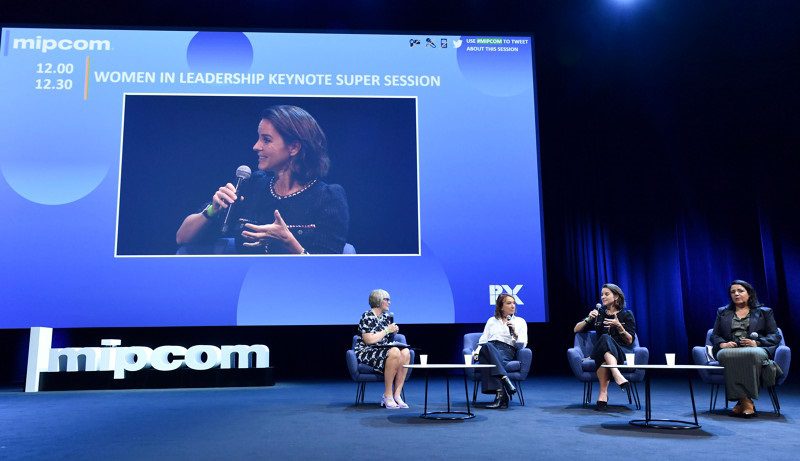
Mediaclubelles’ international mentoring and networking event for women in television, film and digital media has also become an important fixture of the MIPCOM week. Co-organiser Laura Lemens Boy outlined the broad objective of the event: “It’s not just mentoring, it’s support and networking, because mutual support is the best way forward,” she said.
Several sessions dealt with content trends. In Global TV Trends: Who Is Watching What, How And Why?, Glance vice-president Frédéric Vaulpré said content creation is back on track, with 6,650 new series coming to market in 2020/21. In terms of viewing shifts, he said “there is a strong appetite for local content, which suggests content creators should be targeting individual markets and then trying to sell formats for adaptation”. At the same time, however, he said “the streamers, led by Netflix, are driving a trend towards glocalisation, with a growing number of series that have local roots but which are intended to reach a global audience”.
Glance head of content insight Avril Blondelot identified various content trends. Alongside the rise in true crime, she said politics, royalty, history and race had been popular across scripted and non-scripted.
Investment in sport documentaries has also risen rapidly, perhaps because of the Olympics or the lack of live sports available due to COVID-19 restrictions – Avril Blondelot
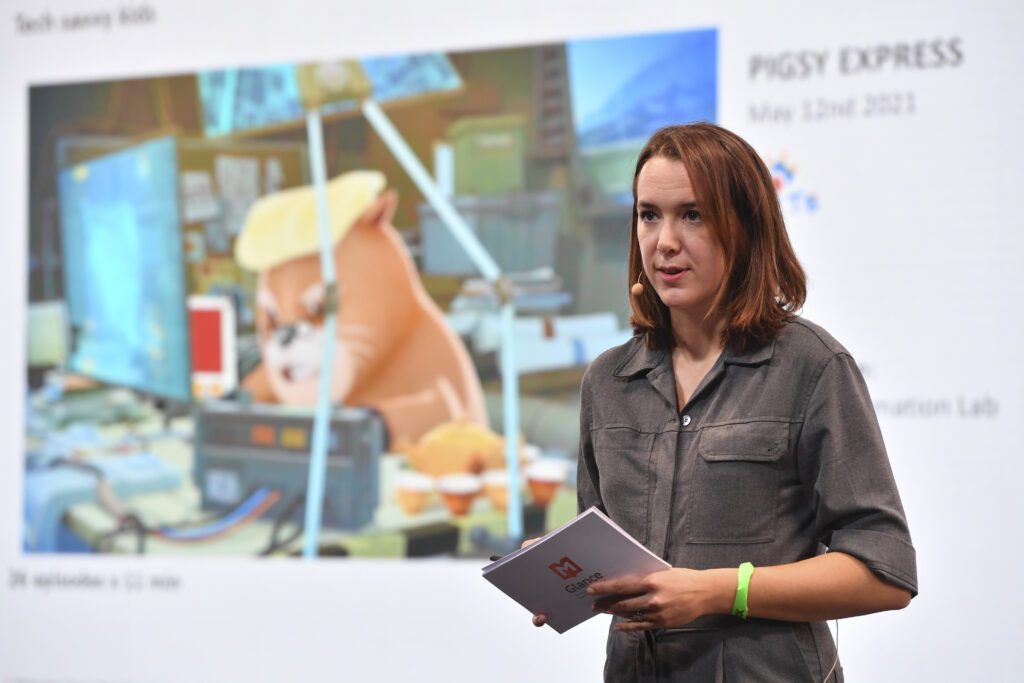
Virginia Mouseler, CEO of The Wit, also provided her usual range of Fresh TV insights. In Fresh TV: Formats she showcased 25 emerging titles, with dating and singing among the key areas under the spotlight. Singing contests such as Alter Ego from Propagate Content International, and Avastars, from Talpa Distribution, both had innovative technological twists.
In another session, K7 Media communications manager David Ciaramella outlined several non-scripted developments (Factual Trends: What’s Next For Non-Scripted). He focused on three key themes: a growth in the number of documentaries looking at modern history, sport and content centred on activism and social change: “TV’s remit has always been to inform, educate and entertain — but now audiences, creatives and industry leaders are insisting on new remits to do with effecting social change and representing society more fairly.” Examples he picked out included Unheard, a LADbible investigative series exploring racial injustice in Australia.
The issue of streaming was a major talking point and MIPCOM 2021 was fortunate to have a range of streamers delivering keynotes. Douglas Craig, senior vice-president programming and acquisitions at ViacomCBS, told delegates Paramount+ is currently in 25 markets, with 45 more territories due to go live in 2022. An SVOD offering, he said the platform is able to draw on “an embarrassment of riches” in terms of the content that is produced in-house. “But the message to content creators is we also want to hear from them.”
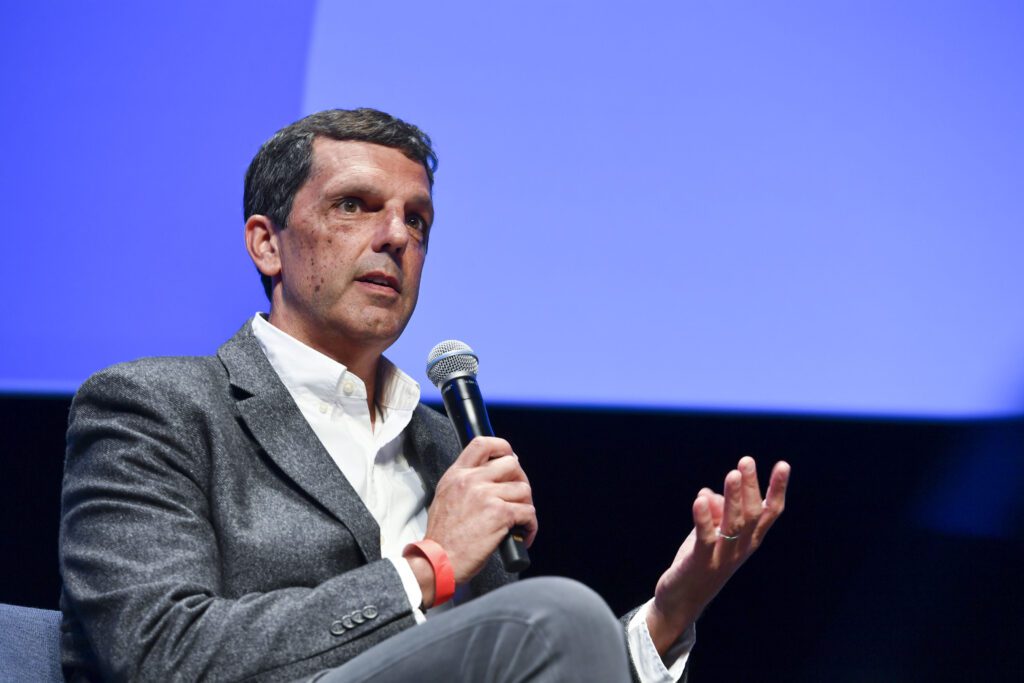
Olivier Jollet, senior vice-president and general manager of ViacomCBS-owned Pluto TV (Paramount+’s sister service), described how the AVOD platform has defied expectations to build a business that currently draws 52 million unique users per month in 25 countries. “People thought we would just have old shows from the 1970s. But now we have 400 great content partners creating niche linear channels across scripted and non-scripted.”
Discovery+ group vice-president, content and acquisitions, Myriam Lopez-Otazu EMEA and APAC, described her platform as “the ultimate destination for real-life entertainment and sport, including esports. Non-scripted superfans can find everything in one place.” But, she added,
We are not competing with other streamers, we are completing the overall offering – Myriam Lopez-Otazu
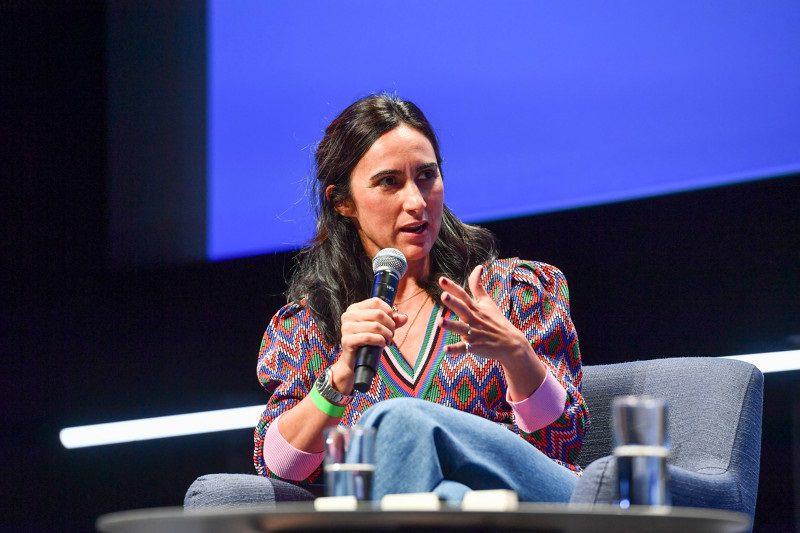
For Nordic-originated streamer Viaplay, NENT Group executive vice-president and chief content officer, Filippa Wallestam, said the global rollout of the platform will follow two models. In territories like Poland and the Netherlands, it will follow the Viaplay blueprint in the Nordics – by offering a mix of premium live sport and scripted series. In territories where it does not have the firepower to compete for sports rights, it will offer a more targeted service – a kind of BritBox for Nordic content. “This is the approach we will take in the US, UK and German-speaking territories,” Wallestam said.
It was a good market for Viaplay, with CEO Anders Jensen the recipient of the 2021 Variety Vanguard Award, presented in association with MIPCOM. A key pillar of Jensen’s strategy has been investment in original content, often in partnership with international companies – examples including Norwegian-originated series Furia.
I’ve always been a big believer in partnerships, even before I came into this industry. There are plenty of ways to work with local broadcasters, other streamers, producers and rights companies that can meet our objectives and deliver value to creators – Anders Jensen
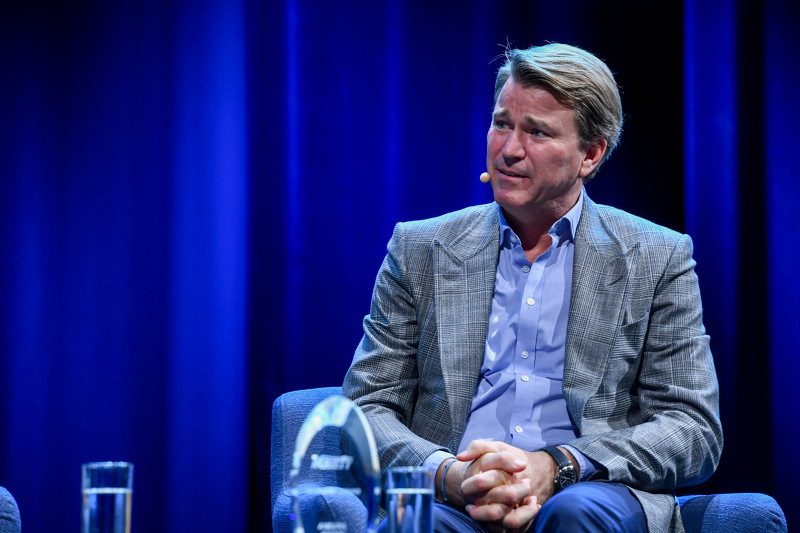
Amid all the sessions involving global streamers, consultant Patrick Connolly, formerly senior vice-president at AMC Networks, said content creators also need to focus on the more curated, niche offerings too: “The big guys want to be everything to everyone. They’re going to have a kids and family component and they’re going to have a local component,” he said during MIPCOM’s How Streaming Is Changing Drama session.
I don’t speak for AMC, but smaller organisations like that are the Davids to the Goliaths. They’re going to want to offer something that’s a little bit more niche – Patrick Connolly
There were sessions to appeal to specialist in every genre. The FRAPA Format Summit welcomed executives from companies including TF1, Banijay, BBC Studios and ITV Studios. The event was hosted by FRAPA co-chair Jan Salling, who spoke of the benefits of face-to-face events. “We can sell by Zoom but we need markets for everything else. “They are the social glue where we build new networks, relationships and co-productions.”
In the kids genre, the BBC argued there is still space for public service broadcasters to serve children. “Like everyone else we are facing greater competition. Yes that is tough but it’s also healthy,” said Patricia Hidalgo, director of BBC Children’s & Education, in the More Broccoli Please: How Do You Balance Public Service With Great Kids Entertainment session.
In drama, Japanese broadcaster WOWOW’s The Grand Family won the Grand Prix in the 2021 MIPCOM Buyers’ Award for Japanese Drama. It was part of a slate of 10 shows assessed by a panel of 12 international judges on their potential to connect with audiences outside Japan. Nine Network’s Geraldine Easter, one of the judges of the award, said she had been “absolutely blown away by the standard” of this year’s line-up.
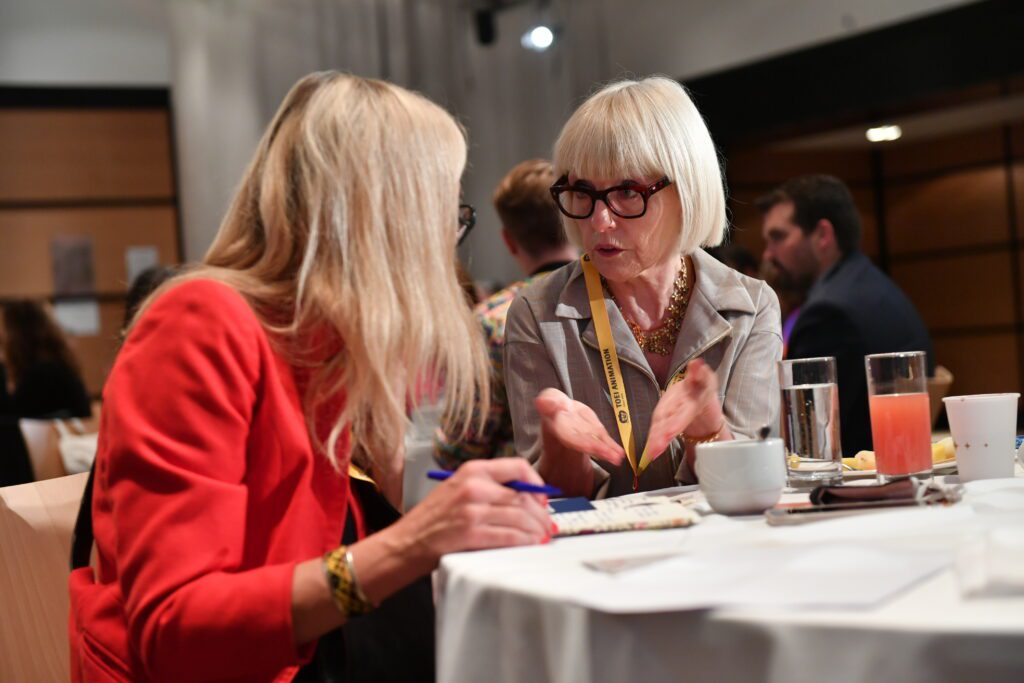
Light relief was provided by comedy legend Ricky Gervais in MIPCOM session, The Best Of Scripted Comedy Formats. Interviewed by Sumi Connock, creative director, formats, at BBC Studios — and piped into Cannes digitally — Gervais talked about the origins of The Office. Discussing the pitching process, he said: “It was made a lot easier because we had something to show them. If we had just taken a script to the BBC I think it would still be in a draw today. They needed to see the performance.”
Money of course is a major consideration in this complex content market – and MIPCOM delegates were given an insight into a range of investor strategies during the Investors’ Brief, on the third day of MIPCOM.
DCD Rights CEO Nicky Davies-Williams said her firm is like “the producer’s business department. We aim to develop a model that allows producers to make money long-term, not just as guns for hire.”
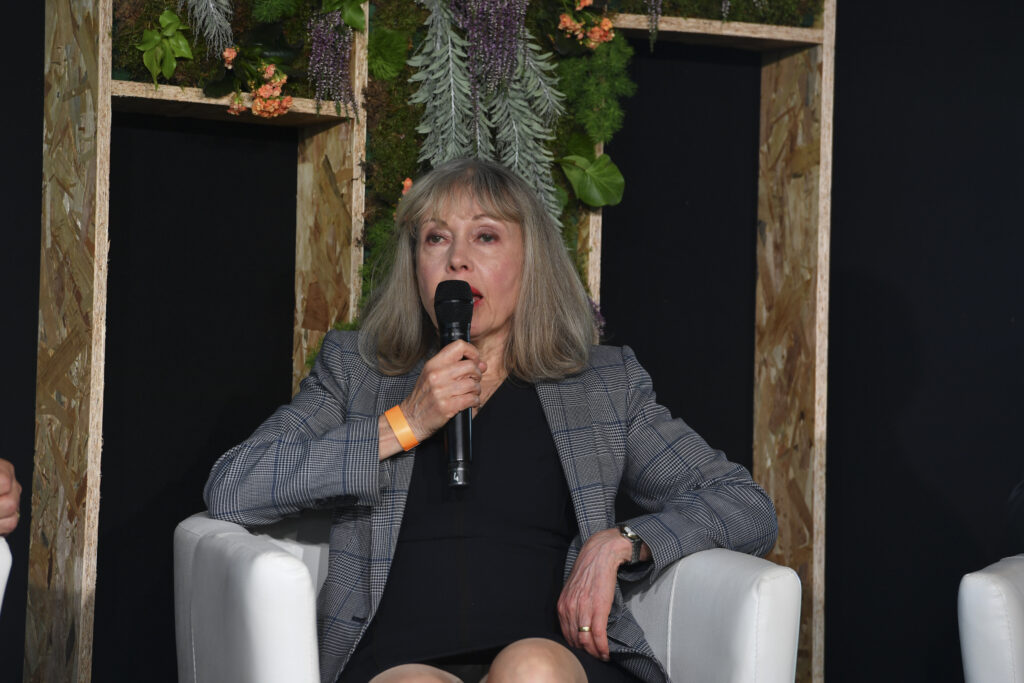
New World Film Finance’s Robert McCrea described his company’s new proposition. “We work with a panel of investors which operates in tech start up and property development. They know there is huge demand in film and TV and have expressed an interest. But what makes them nervous about this sector is lack of process. Our company seeks to provide that process.”
Kids, of course, has its own special place in the Cannes ecosystem. This year, MIPJunior began with a series of sessions focusing on the future of kids content. First up was a Glance session that outlined how channels hosted by entire families have been popular on YouTube and other streaming services – and are now crossing over to broadcast TV. Zavtrak na ura from Russia and The Moshaya Family Animation from the Middle East were two examples cited by Avril Blondelot, during MIPJunior’s Binge Watching Session: Kids Audience Successes Across The Globe.
Another MIPJunior session focused on what counts as high quality in the world of kids’ content and found that children may have different views from the television industry on this question. “They don’t see quality in the same way we do,” chief strategy officer at research firm KidsKnowBest, Peter Robinson, said during MIPJunior’s Kids Behaviour Insights session.
Adam Woodgate, senior vice-president of media insights at Dubit, presented data highlighting a disparity in popularity between the top games and social apps kids use, and the biggest kids TV channels. According to his research, 54% of six- to 11-year-olds in the US played Minecraft in the last week, while 50% played Roblox, 46% played Fortnite, and 45% used Instagram. By contrast, 20% watched Cartoon Network and 19% Nickelodeon.
Elsewhere, Phanta Animation’s animated show Princess Arabella emerged as the winner from a strong group of finalists in this year’s MIPJunior Project Pitch. It’s based on a series of children’s titles by writer and illustrator Mylo Freeman, who wrote the books after seeing a girl step aside during a princess-themed game at a party – “because brown princesses do not exist”. According to director Patrick Chin, the series reflects “that it’s not always easy for children to know how they fit in, or what’s expected of them”.
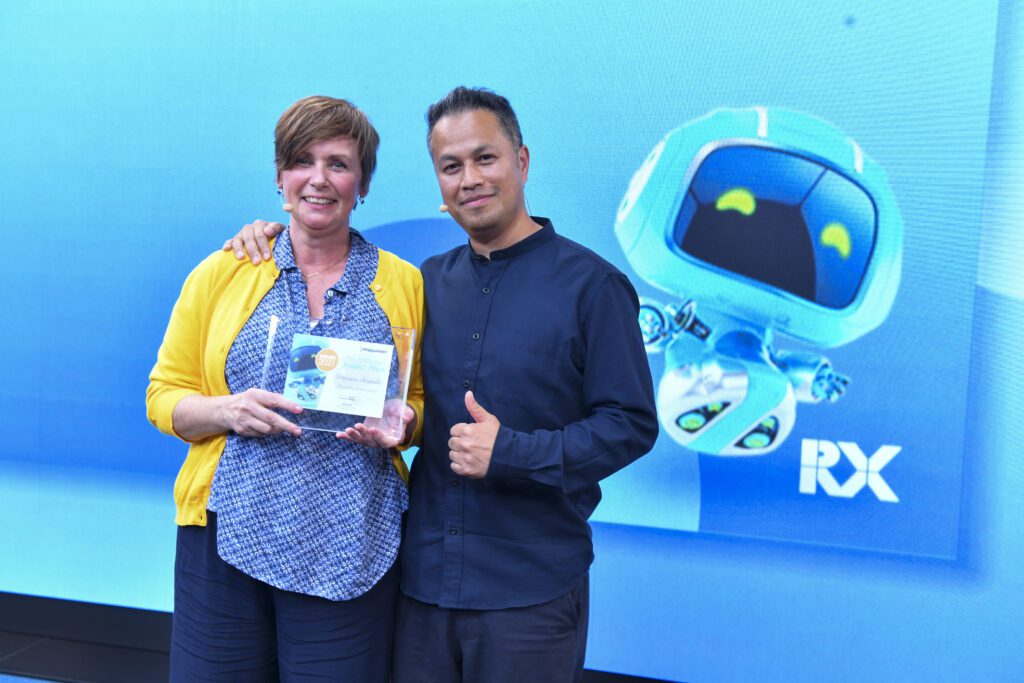
MIPJunior also saw the winners of the International Emmys Kids Awards unveiled. The winners are: Shaun The Sheep: Adventures From Mossy Bottom -– Season 6 in the Kids: Animation category; Tekens Van leven (Scars Of Life) in the Kids: Factual & Entertainment category; and First Day in the Kids: Live-Action category. International Emmy Kids Awards Presenting Partners were: TV Kids, MIPJunior and Ernst & Young.
Discover our new platform onemip ! Coming up – 2022 exclusive content spotlights
Newsletter →
For more information on TV Trends, attend MIPCOM and MIPTV
You can read also :
5 things we learned at MIPCOM 2021
Financing TV production : The magic money tree grows
Battle studies : News from the frontlines of the streaming wars in Europe




